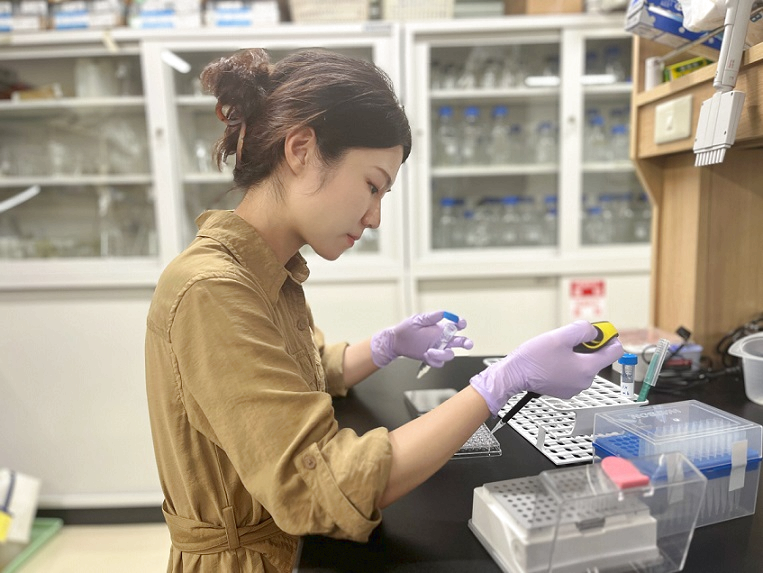Engineering Exosomes: Pioneering Disease Treatments

Xiabing Lyu, Asst. Prof., Nano Life Science Institute (WPI-NanoLSI), Kanazawa University
Xiabing Lyu: From Aspiring Medical Doctor to Cutting-edge Researcher
Xiabing Lyu’s journey from a medical student in China to a pioneering researcher in immunology and cancer immunotherapy is an inspiring tale of passion and dedication. Choosing to pursue a career in research to contribute to cancer treatment, Lyu found her calling at Kanazawa University’s Nano Life Science Institute (NanoLSI). Collaborating with some of the brightest minds in the field, Lyu’s research in engineering exosomes has made remarkable strides in the realm of novel disease treatments.
Exosomes: a promising approach to disease treatment
Exosomes, nanovesicles derived from cells, have captured the attention of medical researchers for their unique properties. With the ability to carry essential cargo such as proteins, RNA, and DNA, exosomes offer tremendous potential for drug delivery and immune modulation in vivo. Key advantages, including low immunogenicity, high stability, and natural presence in biological fluids, make them an invaluable tool in medicine. Lyu’s research leverages these inherent properties to engineer exosomes for targeted therapeutic purposes.
Preventing SARS-CoV-2 Infection: A Global Health Challenge
Since its emergence in 2019, the SARS-CoV-2 virus has posed an unprecedented threat to global public health. Conventional approaches, like anti-spike neutralizing antibodies, have been vital in combating the virus. However, the virus’s high mutation rate enables it to evade neutralizing antibodies, rendering monotherapy insufficient for effective treatment. Addressing this critical challenge, Lyu and her colleagues devised a groundbreaking solution: engineered exosomes co-expressing anti-spike nanobody and IFN-β [1].
By generating a fusion protein comprising the anti-spike nanobody, IFN-β, and MFG-E8, Lyu’s team empowered engineered exosomes to impede SARS-CoV-2 infection. Rigorous experimentation, using the SARS-CoV-2 pseudovirus, demonstrated the remarkable effectiveness of these engineered exosomes in blocking viral infection. Moreover, these exosomes selectively delivered IFN-β signals to infected cells, upregulating the expression of interferon-stimulated genes (ISGs). This important outcome led to the establishment of an anti-viral state within infected cells, offering a new approach in the fight against SARS-CoV-2.
Antigen-Specific T Cell Expansion: Transforming Cancer Immunotherapy
Cancer immunotherapy has ushered in a new era of cancer treatment, but the quest for specificity and reduced side effects remains. Tumor-associated CD8 T cells play a pivotal role in the anti-tumor response, making them an ideal target for cancer treatment. In this area of research, Lyu and her colleagues engineered antigen-presenting designer exosomes (AP-Exo) to amplify the characteristics of professional antigen-presenting cells (APCs) [2].
The AP-Exo design involved the expression of a peptide-major histocompatibility class I (pMHCI) complex, a costimulatory CD80 molecule, and IL-2 on the exosome’s surface. This enabled simultaneous antigen, CD80, and IL-2 presentation to antigen-specific CD8 T cells, culminating in the clonal expansion and differentiation of antigen-specific cytotoxic T lymphocytes (CTLs) and potent anti-cancer effects. Further modifications to AP-Exo for in-vivo expansion of Chimeric Antigen Receptor (CAR)-T cells, through CAR ligand and IL-2 expression on its surface, demonstrated selective expansion of CAR T cells in vivo, offering enhanced anticancer immunity.
Exosome engineering for a healthier and disease-free future
Xiabing Lyu’s groundbreaking research in engineering exosomes for disease treatment demonstrates the potential of nanomaterials in shaping the future of medicine. Her achievements in preventing SARS-CoV-2 infection and advancing cancer immunotherapy pave the way for more effective and targeted treatments. As the field of immunology continues to evolve, Lyu and her colleagues will undoubtedly be at the forefront in transforming medical interventions and ushering in a healthier and disease-free future.
References
[1] Xiabing Lyu, Shota Imai, Tomoyoshi Yamano, Rikinari Hanayama. Pharmaceutical Research 2022 Sep 26;1-9.
http://doi: 10.1007/s11095-022-03400-0
[2] Xiabing Lyu, Tomoyoshi Yamano, Shota Imai, LE VAN Toan, Makie Ueda, and Rikinari Hanayama. Manuscript preparation
Further information
Asst.Prof. Xiabing Lyu’s episode on the NanoLSI Podcast.
Posted Sep. 4, 2023




